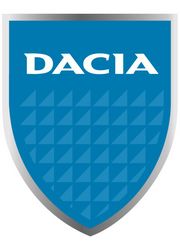.
Dacia: Difference between revisions
No edit summary |
Red marquis (talk | contribs) No edit summary |
||
| Line 1: | Line 1: | ||
[[Image:Dacialogo.jpg|thumb|right|180px]] | |||
'''Dacia''' ({{IPA2|'da.ʧi.a}}) is a Romanian [[automobile|car]] maker which is a subsidiary of [[Renault]] group. | '''Dacia''' ({{IPA2|'da.ʧi.a}}) is a Romanian [[automobile|car]] maker which is a subsidiary of [[Renault]] group. | ||
==History== | ==History== | ||
Revision as of 07:53, 12 January 2007
Dacia (IPA: ['da.ʧi.a]) is a Romanian car maker which is a subsidiary of Renault group.
History
Dacia started to collabrate with Renault in 1966 and The main Dacia factory was built in 1968, in Colibaşi (now called Mioveni), near Piteşti
Dacia had acquired the tooling and basic designs of Renault 12. In export markets it was known as the Dacia Denem. Minor cosmetic changes were made every few years in an effort to increase the public's interest in purchasing a newer model, but the main design features of the car were still the same year after year, rendering it outdated. The most popular model was Dacia 1300. Some minor improvements followed in Dacia 1310, 1400, 1410. In addition to the sedan and wagon versions of the original Renault 12, there was also a pick-up version, and later a hatchback.
During the Communist era, in the plant where Dacias were made there were two assembly lines: one line producing Dacias intended for sale in Romania and the other line producing the same car (albeit from superior parts, and assembled with greater care) for export. It is common knowledge that many Romanians living near the Hungarian border purchased their Dacia in Hungary and drove it back home.
The two models of cars produced by Dacia in 2006 are the Dacia Logan and the Dacia Gamma pick-up. The Dacia Logan is also sold under the Renault brand (Renault Logan) in some countries.
In the UK, the advertising slogan used for the car was 'The Very Acceptable Dacia Denem', but this proved not to be the case with British buyers, who increasingly opted for more reliable Japanese, South Korean and Malaysian models.
In September 1999, Dacia was bought by the Renault group, with a view to making Romania its hub of automobile development in both Central Europe and Eastern Europe.
Dacia sold 53,000 vehicles in 2002, and it holds an almost 50 per cent market share in Romania.
Between 1995 and 2000, along with the 1310, Dacia has also produced a model which was not a Renault 12 derivative, the Dacia Nova. Between 2000 and 2003 Dacia SuperNova (which looked like the Nova) took its place with a Renault engine and gearbox and air conditioning option. Dacia Solenza, which had power steering and driver airbag options followed SuperNova. Solenza is no longer produced since 2005.
On July 21, 2004 the last models of the 1300 series rolled out the gates of the Mioveni production facility. It is the end of an era, the models being removed with just one month ahead of their 35th anniversary. Still, the factory will continue to manufacture the utility versions of the 1300 series (pick-up, drop-side, double-cab, with gasoline or diesel engines). In all its 35 years' existence, Dacia 1300 never had a diesel engine, air conditioning, power steering, anti-lock braking system or airbags.
Models
- Dacia 1100 (1968-1971)
- Dacia 1300 (1969-1983) / Dacia Denem (in the United Kingdom)
- Dacia 1310 (1983-2004)
- Dacia 2000
- Dacia Duster / ARO 10 (1985 - 2005)
- Dacia 500 (Lăstun) (-1989)
- Dacia Gamma
- Dacia Liberta Hatchback
- Dacia Nova (1995-2000) - (Peugeot 309 based)
- Dacia SuperNova (2000-2003)
- Dacia Solenza (2003-2005)
- Dacia Logan (2004-today)
Prototypes
- Dacia Brasovia coupè (prototype only)
- Dacia Jumbo Highrise van(prototype only)
- Dacia Nova Minivan (prototype only)
Models - Regional Variations and Trivia
- After the failure of the Renault 12 based Dacia Denem in the UK market, the British importer of Dacia decided to re-badge the ARO 10 4x4 vehicle as the Dacia Duster.
- The Dacia Nova was partly based on the Peugeot 309, a design Peugeot inherited from their Talbot division.
External links
- The Dacia web site, in English, French and Romanian languages
- Dacia brand on Renault site
- Dacia models, very interesting but outdated, does not contain the latest models
- Romanian Cars site, including Dacia
- A forum of Dacia owners, in Romanian language, also with an English subforum
- The most famous Romanian Aro and Dacia 4x4 enthusiasts

